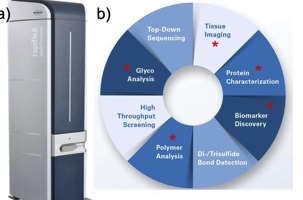Acquisition of mass spectrometry instrument positions ASU at leading edge of technology globally

Professor Alexandra Ros of ASU's School of Molecular Sciences was awarded a Matrix Assisted Laser Desorption/Ionization (MALDI) instrument by the National Institutes of Health.
Mass spectrometry is an essential scientific tool that can be used to measure the mass-to-charge ratio of ions of proteins and other biomolecules.
At Arizona State University, mass spectrometry is used to support biochemical and biomedical research critical for the future of our society, allowing researchers to gain an understanding of the detailed structure and mechanisms with which proteins and other biomolecules interact and fulfill important biological functions that allows them to fight maladies such as neurodegenerative diseases, cancer and infectious disease outbreaks, as well as solve our society’s future energy needs.
In 2018, ASU centralized its mass spectrometry services in a biosciences core facility (part of Knowledge Enterprise) that serves over 100 researchers throughout the university and surrounding academic and biotechnology units; the Mass Spectrometry Facility, part of the biosciences core, is housed in the Biodesign Institute.
Recently, Professor Alexandra Ros, principal investigator in ASU’s School of Molecular Sciences and faculty member in the Biodesign Institute’s Center for Applied Structural Discovery, was awarded a Matrix Assisted Laser Desorption/Ionization (MALDI) instrument by the National Institutes of Health.
“We are proud of having acquired critical funding for an important analytical instrument,” Ros says. “This mass spectrometer will support the projects of ASU researchers, enable faster turnaround time on important questions, allow student training on a cutting-edge instrument and enable novel capabilities such as mass spectrometric imaging, not only for ASU, but the greater Phoenix area.”
“With the addition of the MALDI instrument, ASU will have one of the most extensive arrays of mass spectrometry instrumentation and expertise in the world,” says Professor Tijana Rajh, director of the School of Molecular Sciences. “It is a very important and expensive analytical tool that will position us to elucidate critical innovative designs in different areas ranging from biology to nanoscience.”
MALDI is a very sensitive technique for determining the mass of proteins, peptides or polymers. Protein masses allow for protein identification. MALDI sample preparation is also relatively fast and easy.
The sample for MALDI is uniformly mixed in a large quantity of matrix. The matrix absorbs the ultraviolet light and ultimately ionizes the analytes to be assessed in the MALDI mass spectrometer.
Simultaneous measurement of all mass-to-charge ratios with time-of-flight mass spectrometry improves speed and sensitivity, ensures that no important information is lost, and makes it easier to identify analytes and interpret measurements.
The many collaborators
Other NIH and National Science Foundation grant holders from the School of Molecular Sciences include professors Nicholas Stephanopoulos, Sidney Hecht, Jeremy Mills, Ana Moore, Gary Moore, Petra Fromme and Chad Borges. Associate Professor Sara Vaiana, from the Department of Physics, as well as professors Ramon Velasquez and Diego Mastroeni from the School of Life Sciences will also be involved. Professor Todd Sandrin, who is the vice provost and dean of the New College of Interdisciplinary Arts and Sciences at ASU's West campus, will also use the instrumentation. Timothy Karr, who has a doctorate in chemistry and is an expert in proteomics, is the Mass Spectrometry Facility manager.
The MALDI instrument will support the projects of ASU researchers. Photo courtesy of Bruker manufacturer
Stephanopoulos is currently the recipient of an NIH Director's New Innovator Award synthesizing full-length proteins from DNA templates and anchoring protein-DNA conjugates to surfaces which will be significantly improved by the high resolution and speed accomplished with the new MALDI instrument.
The projects of Hecht and Mills on novel peptide constructs will be greatly enhanced. Mills will no longer need to ship his samples to external collaborators and can assure in-house training of his students on mass spectrometry.
Sandrin’s projects investigating gut microbiota are funded through prestigious awards from the Phoenix Children’s Hospital Leadership Circle and Mayo Clinic Ken and Linda Morris Weight and Wellness Solutions Program.
A study of neurodegenerative diseases like Alzheimer’s will also be a focus. Ros, Mastroeni, Velazquez and Fromme will direct this research. There is hope for a huge future impact on the field, as Alzheimer’s is one of the deadliest diseases in the U.S., as well as a projected major challenge for our society. This work is further well embedded in the framework of the ASU-Banner Neurodegenerative Disease Center located in the Biodesign Institute.
Karr’s project on Drosophila sperm similarly will take advantage of the imaging capabilities of the instrument.
Ana and Gary Moore will strive to gain biomolecular signatures important in understanding energy conversion and photosynthesis to solve our future generation’s energy needs.
The new MALDI mass spectrometry instrument will upgrade the available mass spectrometry analysis capabilities at ASU to meet the needs of currently funded NIH, NSF and Department of Energy researchers, but will also provide a tool paving the way for the next generation of research projects facilitated through high-end mass spectrometry.
More Science and technology

How AI is changing college
Artificial intelligence is the “great equalizer,” in the words of ASU President Michael Crow.It’s compelled industries, including…

The Dreamscape effect
Written by Bret HovellSeventh grader Samuel Granado is a well-spoken and bright student at Villa de Paz Elementary School in…

Research expenditures ranking underscores ASU’s dramatic growth in high-impact science
Arizona State University has surpassed $1 billion in annual research funding for the first time, placing the university among the…
